初中英语情态动词练习题及答案
- 格式:docx
- 大小:16.67 KB
- 文档页数:2
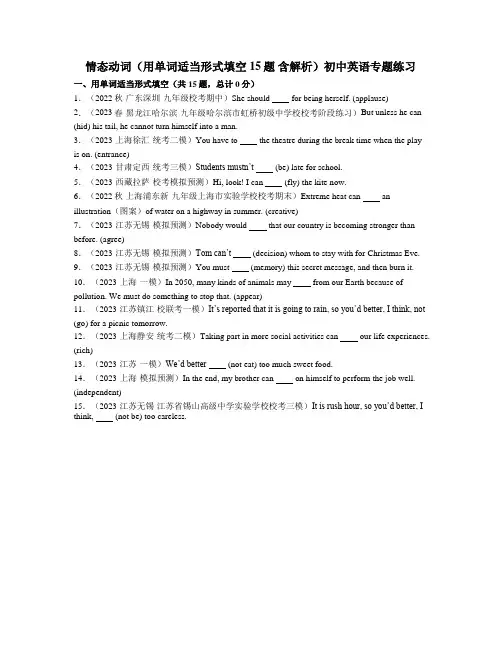
情态动词(用单词适当形式填空 15题含解析)初中英语专题练习一、用单词适当形式填空(共15题,总计0分)1.(2022秋·广东深圳·九年级校考期中)She should for being herself. (applause)2.(2023春·黑龙江哈尔滨·九年级哈尔滨市虹桥初级中学校校考阶段练习)But unless he can (hid) his tail, he cannot turn himself into a man.3.(2023·上海徐汇·统考二模)You have to the theatre during the break time when the playis on. (entrance)4.(2023·甘肃定西·统考三模)Students mustn’t (be) late for school.5.(2023·西藏拉萨·校考模拟预测)Hi, look! I can (fly) the kite now.6.(2022秋·上海浦东新·九年级上海市实验学校校考期末)Extreme heat can anillustration(图案)of water on a highway in summer. (creative)7.(2023·江苏无锡·模拟预测)Nobody would that our country is becoming stronger than before. (agree)8.(2023·江苏无锡·模拟预测)Tom can’t (decision) whom to stay with for Christmas Eve. 9.(2023·江苏无锡·模拟预测)You must (memory) this secret message, and then burn it. 10.(2023·上海·一模)In 2050, many kinds of animals may from our Earth because of pollution. We must do something to stop that. (appear)11.(2023·江苏镇江·校联考一模)It’s reported that it is going to rain, so you’d better, I think, not (go) for a picnic tomorrow.12.(2023·上海静安·统考二模)Taking part in more social activities can our life experiences. (rich)13.(2023·江苏·一模)We’d better (not eat) too much sweet food.14.(2023·上海·模拟预测)In the end, my brother can on himself to perform the job well. (independent)15.(2023·江苏无锡·江苏省锡山高级中学实验学校校考三模)It is rush hour, so you’d better, I think, (not be) too careless.【参考答案】一、用单词适当形式填空(单句)(共15题,总计0分)1.applaud【详解】句意:她应该为她自己鼓掌。
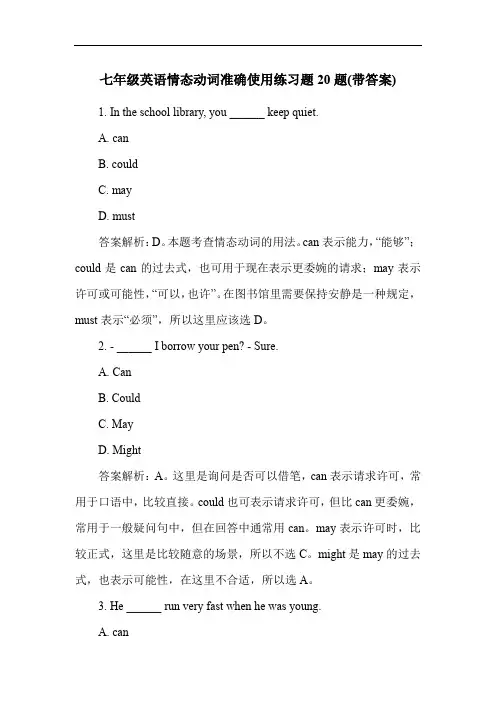
七年级英语情态动词准确使用练习题20题(带答案)1. In the school library, you ______ keep quiet.A. canB. couldC. mayD. must答案解析:D。
本题考查情态动词的用法。
can表示能力,“能够”;could是can的过去式,也可用于现在表示更委婉的请求;may表示许可或可能性,“可以,也许”。
在图书馆里需要保持安静是一种规定,must表示“必须”,所以这里应该选D。
2. - ______ I borrow your pen? - Sure.A. CanB. CouldC. MayD. Might答案解析:A。
这里是询问是否可以借笔,can表示请求许可,常用于口语中,比较直接。
could也可表示请求许可,但比can更委婉,常用于一般疑问句中,但在回答中通常用can。
may表示许可时,比较正式,这里是比较随意的场景,所以不选C。
might是may的过去式,也表示可能性,在这里不合适,所以选A。
3. He ______ run very fast when he was young.A. canB. couldC. mayD. might答案解析:B。
句中提到“when he was young”是过去的时间,can 的过去式是could,表示过去的能力,他年轻时能跑得很快,所以选B。
A选项can表示现在的能力;C选项may表示许可或可能性,与题意不符;D选项m ight表示可能性,在这里不表示能力,所以不选。
4. - ______ it be true? - I'm not sure.A. CanB. CouldC. MayD. Might答案解析:A。
这里是对事情真实性的一种推测,can用于疑问句中表示推测,“可能”,通常用于否定句和疑问句中。
could也可用于表示推测,但这里没有必要用过去式。
may和might表示可能性时,一般不用于疑问句的这种推测,所以选A。
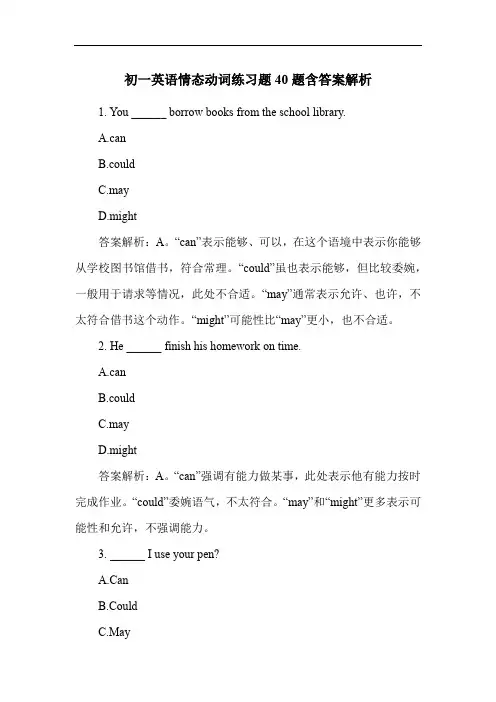
初一英语情态动词练习题40题含答案解析1. You ______ borrow books from the school library.A.canB.couldC.mayD.might答案解析:A。
“can”表示能够、可以,在这个语境中表示你能够从学校图书馆借书,符合常理。
“could”虽也表示能够,但比较委婉,一般用于请求等情况,此处不合适。
“may”通常表示允许、也许,不太符合借书这个动作。
“might”可能性比“may”更小,也不合适。
2. He ______ finish his homework on time.A.canB.couldC.mayD.might答案解析:A。
“can”强调有能力做某事,此处表示他有能力按时完成作业。
“could”委婉语气,不太符合。
“may”和“might”更多表示可能性和允许,不强调能力。
3. ______ I use your pen?A.CanB.CouldC.May答案解析:A 或C 都可以。
“Can I use your pen?”和“May I use your pen?”在请求别人允许时都可以用。
“could”和“might”语气更委婉,但不如“can”和“may”常用。
4. She ______ come to school early tomorrow.A.canB.couldC.mayD.might答案解析:C 或D。
“may”和“might”都表示可能性,此处表示她明天可能早点来学校。
“can”和“could”强调能力,不太符合语境。
5. We ______ listen to the teacher carefully in class.A.canB.couldC.mayD.might答案解析:A。
“can”表示能够、应该,在课堂上我们应该认真听老师讲课,符合语境。
“could”委婉语气,不太恰当。
“may”和“might”更多表示可能性和允许。
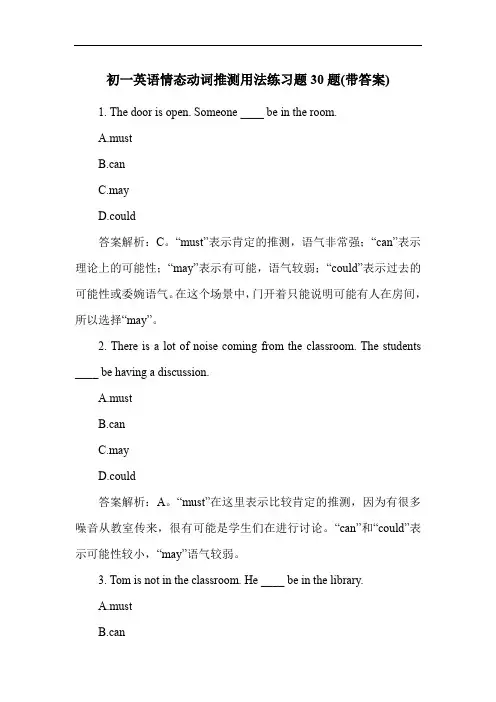
初一英语情态动词推测用法练习题30题(带答案)1. The door is open. Someone ____ be in the room.A.mustB.canC.mayD.could答案解析:C。
“must”表示肯定的推测,语气非常强;“can”表示理论上的可能性;“may”表示有可能,语气较弱;“could”表示过去的可能性或委婉语气。
在这个场景中,门开着只能说明可能有人在房间,所以选择“may”。
2. There is a lot of noise coming from the classroom. The students ____ be having a discussion.A.mustB.canC.mayD.could答案解析:A。
“must”在这里表示比较肯定的推测,因为有很多噪音从教室传来,很有可能是学生们在进行讨论。
“can”和“could”表示可能性较小,“may”语气较弱。
3. Tom is not in the classroom. He ____ be in the library.A.mustB.canD.could答案解析:C。
“may”表示有可能,因为汤姆不在教室,只是有可能在图书馆,不能确定,所以选择“may”。
“must”语气太强,“can”和“could”也不太符合这个场景。
4. The light in the office is on. Someone ____ be working there.A.mustB.canC.mayD.could答案解析:C。
灯亮着只能说明有可能有人在办公室工作,“may”语气较弱,符合这个场景。
“must”太肯定,“can”和“could”也不太恰当。
5. There are some footprints on the ground. Someone ____ have walked here.A.mustB.canC.mayD.could答案解析:C。
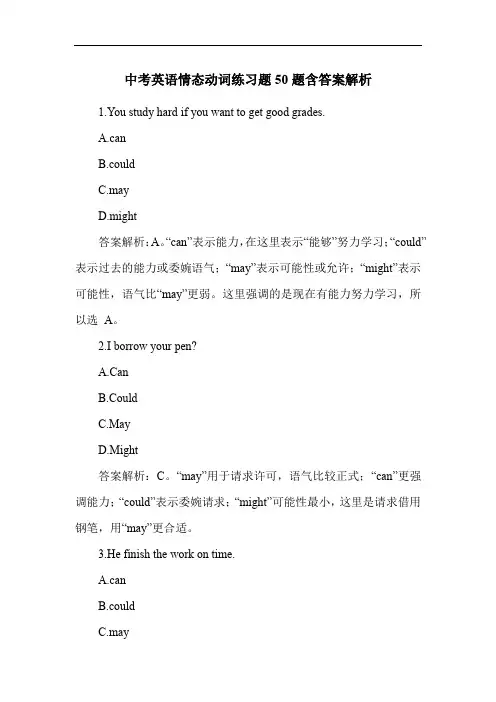
中考英语情态动词练习题50题含答案解析1.You study hard if you want to get good grades.A.canB.couldC.mayD.might答案解析:A。
“can”表示能力,在这里表示“能够”努力学习;“could”表示过去的能力或委婉语气;“may”表示可能性或允许;“might”表示可能性,语气比“may”更弱。
这里强调的是现在有能力努力学习,所以选A。
2.I borrow your pen?A.CanB.CouldC.MayD.Might答案解析:C。
“may”用于请求许可,语气比较正式;“can”更强调能力;“could”表示委婉请求;“might”可能性最小,这里是请求借用钢笔,用“may”更合适。
3.He finish the work on time.A.canB.couldC.may答案解析:A。
“can”表示能力,这里表示他有能力按时完成工作;“could”过去的能力或委婉语气;“may”表示可能性或允许;“might”可能性最小,这里强调能力,选A。
4. you help me with this problem?A.CanB.CouldC.MayD.Might答案解析:B。
“could”在这里表示委婉地请求帮助;“can”语气比较直接;“may”和“might”主要表示可能性和允许,不太符合语境。
5.She come to the party if she has time.A.canB.couldC.mayD.might答案解析:C。
“may”表示可能性,在这里表示她有可能来参加派对如果有时间;“can”表示能力;“could”过去的能力或委婉语气;“might”可能性比“may”更小。
6.We go to the park if it doesn't rain.A.canB.couldD.might答案解析:A。
“can”表示能够,这里表示如果不下雨我们能够去公园;“could”过去的能力或委婉语气;“may”表示可能性或允许;“might”可能性最小。
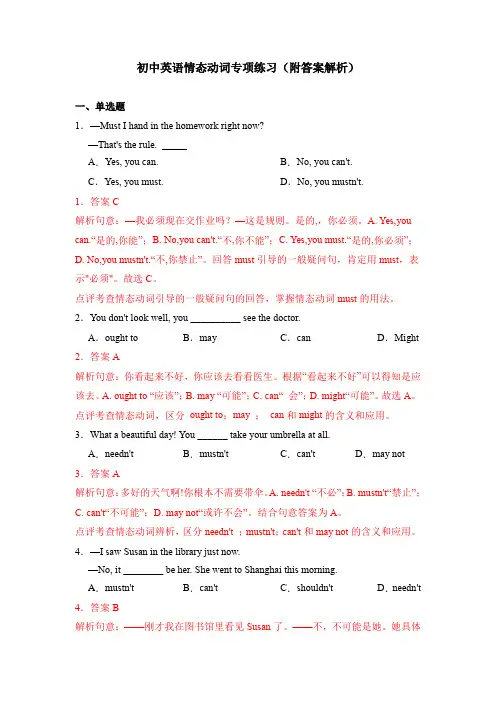
初中英语情态动词专项练习(附答案解析)一、单选题1.—Must I hand in the homework right now?—That's the rule.A.Yes, you can.B.No, you can't.C.Yes, you must.D.No, you mustn't.1.答案C解析句意:—我必须现在交作业吗?—这是规则。
是的,,你必须。
A. Yes,you can.“是的,你能”;B. No,you can't.“不,你不能”;C. Yes,you must.“是的,你必须”;D. No,you mustn't.“不,你禁止”。
回答must引导的一般疑问句,肯定用must,表示"必须"。
故选C。
点评考查情态动词引导的一般疑问句的回答,掌握情态动词must的用法。
2.You don't look well, you __________ see the doctor.A.ought to B.may C.can D.Might 2.答案A解析句意:你看起来不好,你应该去看看医生。
根据“看起来不好”可以得知是应该去。
A. ought to “应该”;B. may “可能”;C. can“ 会”;D. might“可能”。
故选A。
点评考查情态动词,区分ought to;may ;can和might的含义和应用。
3.What a beautiful day! You ______ take your umbrella at all.A.needn't B.mustn't C.can't D.may not 3.答案A解析句意:多好的天气啊!你根本不需要带伞。
A. needn't “不必”;B. mustn't“禁止”;C. can't“不可能”;D. may not“或许不会”。
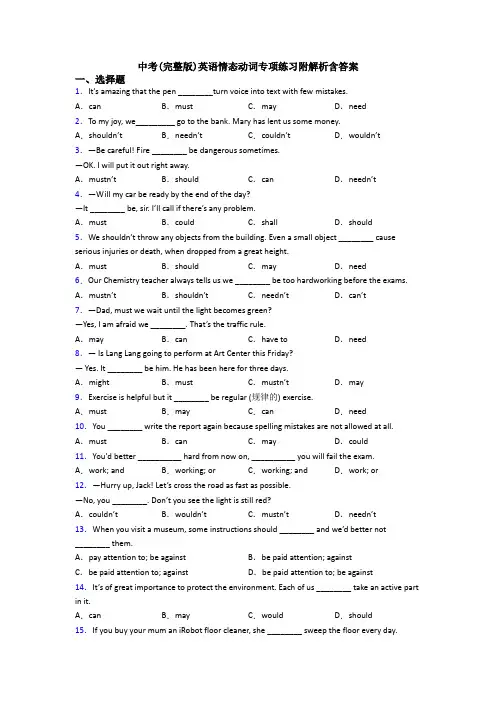
中考(完整版)英语情态动词专项练习附解析含答案一、选择题1.It’s amazing that the pen ________turn voice into text with few mistakes.A.can B.must C.may D.need2.To my joy, we_________ go to the bank. Mary has lent us some money.A.shouldn’t B.needn’t C.couldn’t D.wouldn’t3.—Be careful! Fire ________ be dangerous sometimes.—OK. I will put it out right away.A.mustn’t B.should C.can D.needn’t4.—Will my car be ready by the end of the day?—It ________ be, sir. I’ll call if there’s any problem.A.must B.could C.shall D.should5.We sh ouldn’t throw any objects from the building. Even a small object ________ cause serious injuries or death, when dropped from a great height.A.must B.should C.may D.need6.Our Chemistry teacher always tells us we ________ be too hardworking before the exams. A.mustn’t B.shouldn’t C.needn’t D.can’t 7.—Dad, must we wait until the light becomes green?—Yes, I am afraid we ________. That’s the traffic rule.A.may B.can C.have to D.need8.— Is Lang Lang going to perform at Art Center this Friday?— Yes. It ________ be him. He has been here for three days.A.might B.must C.mustn’t D.may 9.Exercise is helpful but it ________ be regular (规律的) exercise.A.must B.may C.can D.need10.You ________ write the report again because spelling mistakes are not allowed at all. A.must B.can C.may D.could11.You'd better __________ hard from now on, __________ you will fail the exam. A.work; and B.working; or C.working; and D.work; or 12.—Hurry up, Jack! Let’s cross the road as fast as possible.—No, you ________. Don’t you see t he light is still red?A.couldn’t B.wouldn’t C.mustn’t D.needn’t 13.When you visit a museum, some instructions should ________ and we’d better not________ them.A.pay attention to; be against B.be paid attention; againstC.be paid attention to; against D.be paid attention to; be against14.It’s of great importance to protect the environment. Each of us ________ take an active part in it.A.can B.may C.would D.should15.If you buy your mum an iRobot floor cleaner, she ________ sweep the floor every day.A.c an’t B.mustn’t C.needn’t D.shouldn’t 16.—Have you decided to take up teaching as career after graduation?—I ________ go abroad for further education instead. But it depends.A.must B.should C.may D.shall17.The boy is very brave.I ________ he ________ the tall tree.A.dare say; dares to climbB.dare to say; dare climbingC.dare saying; dares climbD.dare to say; dares climbed18.---Will you be back early this evening?---Yes, but I ________ be a little late. Our boss sometimes has extra work for us.A.may B.must C.need D.will19.We’ve discussed every detail of this plan and have got everything ready. But still something __________ go wrong. We still have to be very careful.A.must B.should C.would D.may 20.—Amy, I hear you've got many foreign coins._______ I have a look?—Of course, I'll fetch them for you.A.May B.MustC.Should D.Need21.My bike was broken yesterday,so I____walk home.A.might B.had to C.must D.could 22.—Would you please________in that way? That’s not safe!—Sorry. I won’t do it any more.A.not driving B.not to drive C.no driving D.not drive 23.Dr. Zhong Nanshan once said, "To prevent the spread of this disease, we________never be too careful."A.can B.may C.must D.should 24.Don’t cross the road until the traffic lights turn green. A car_______hit you.A.need B.may C.should D.must 25.—Where is Tom? I am considering ________ him about the result of the exam.—Oh. You ________. He has known it already.A.to tell; can't B.telling; needn't C.tell; mustn't D.told; shouldn't 26.You ________ pay too much attention to protecting yourself if you plan to go abroad. A.mustn’t B.can’t C.shouldn’t D.needn’t27.To avoid ________, we’d better ________ the parents’ meeting online.A.gather; hold B.gathering; hold C.gather; holding D.to gather; to hold 28.You ________ require others to do with the problem like you. Everyone has his own way. A.mustn’t B.needn’t C.may not D.shouldn’t 29.—How do you like my new dress?—Well, if I ________ say, it is not suitable for you.A.may B.must C.have to D.should 30.—Must the children leave at six tomorrow morning?—No, they _______. They can have more time to get ready for the trip.A.can’t B.needn’t C.mustn’t D.may not 31.—Mum, why do I have to wear a mask before entering the supermarket?—For your health and safety, you ________ be too careful.A.shouldn’t B.can’t C.mustn’t D.needn’t 32.According to the rule, used batteries ________ be dropped in the red bin for harmful wastes. A.may B.would C.should D.might33.You _________ smoke here! Look at the sign. It says "No smoking".A.needn't B.mustn't C.can D.may34.— Listen! Tom ________ be listening to the music while doing his homework.—Let’s go upstairs to remind him to turn it off.A.should B.could C.would D.must35.—Is that Mr Zhou?—It ________ be him. He has gone to Beijing.A.can B.may C.can’t D.shouldn’t 36.Never throw objects from the building. Even a small object ________ cause serious injuries, or death, when dropped from a great height.A.must B.should C.may D.need37.—The high school entrance examination is coming!— Yes, our teacher tells us we ________ be too careful while taking exams.A.mustn’t B.shouldn’t C.needn’t D.can’t38.— Is the boy over there Tom? He often wears a jacket like that.— It _______ be him. He is absent from school today.A.needn’t B.shou ldn’t C.mustn’t D.can’t39.—Is it really necessary for me to go shopping with a mask on?—I’m afraid you ________ in public. It is not only to protect yourself but also to protect others. A.must B.should C.can D.need40.Look at the floor, Tom! ________ you watch TV while having a meal?A.Should B.Could C.Must D.May41.Cars ________ give way to walkers on some roads in Binhai, or the drivers will be fined. A.may B.will C.can D.must 42.Sometimes smiles ________ be false, hiding other feelings like anger, fear or worry. A.should B.would C.must D.can43.—Could you tell me how to renew the library books?—With pleasure. You ________ come to our desk every time. It’s easier to renew them online. A.can’t B.mustn’t C.needn’t D.shouldn’t44.For the safety of the passengers, objects like guns ________ be carried on board.A.may not B.needn’t C.might not D.mustn’t 45.—The article says that a person’s animal sign decides his personality.—You ________ read it for fun, but don’t believe in that.A.can B.must C.shouldn’t D.needn’t 46.—How beautiful the winter jasmines (迎春花) are!—Yes. These golden-yellow flowers ________ be widely seen in my city in March.A.must B.can C.would D.should 47.—Mum, I bought some strawberries on my way home.—Oh, you’re so sweet. But the strawbe rries ________ be put into the fridge for freshness. A.must B.can C.may D.need48.— What do you think of the show yesterday?— Some of them were really good but others ________ be better.A.will B.must C.need D.can49.—May I have some wine to drink?—No, you ________. You have to drive home later.A.mustn’t B.needn’t C.can’t D.may not 50.—Will Jim come to Yangzhou for a holiday?—He ________come and it depends on how much homework he will have.A.may B.should C.must D.need【参考答案】***试卷处理标记,请不要删除一、选择题1.A解析:A【详解】句意:神奇的是,这支笔能把声音转换成文字,而且很少出错。
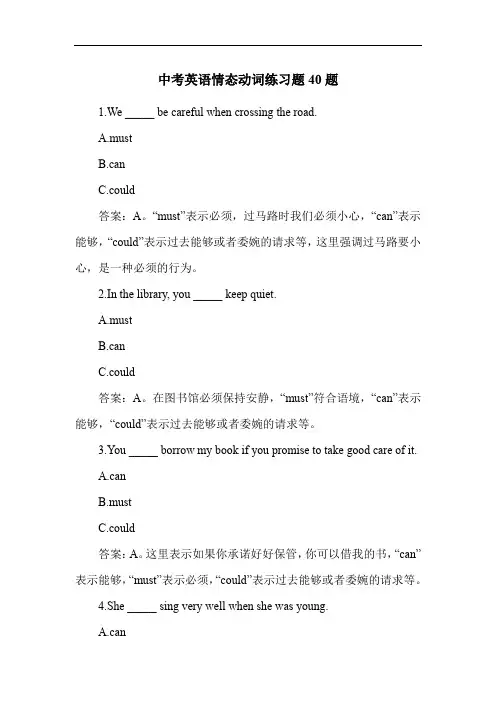
中考英语情态动词练习题40题1.We _____ be careful when crossing the road.A.mustB.canC.could答案:A。
“must”表示必须,过马路时我们必须小心,“can”表示能够,“could”表示过去能够或者委婉的请求等,这里强调过马路要小心,是一种必须的行为。
2.In the library, you _____ keep quiet.A.mustB.canC.could答案:A。
在图书馆必须保持安静,“must”符合语境,“can”表示能够,“could”表示过去能够或者委婉的请求等。
3.You _____ borrow my book if you promise to take good care of it.A.canB.mustC.could答案:A。
这里表示如果你承诺好好保管,你可以借我的书,“can”表示能够,“must”表示必须,“could”表示过去能够或者委婉的请求等。
4.She _____ sing very well when she was young.A.canB.couldC.must答案:B。
表示她年轻时能够唱歌很好,“could”表示过去能够,“can”表示现在能够,“must”表示必须。
5.We _____ finish our homework on time.A.mustB.canC.could答案:A。
我们必须按时完成作业,“must”符合语境,“can”表示能够,“could”表示过去能够或者委婉的请求等。
6.You _____ come to my party if you are free.A.canB.mustC.could答案:A。
如果你有空,你可以来我的派对,“can”表示能够,“must”表示必须,“could”表示过去能够或者委婉的请求等。
7.He _____ swim when he was five years old.A.canB.couldC.must答案:B。
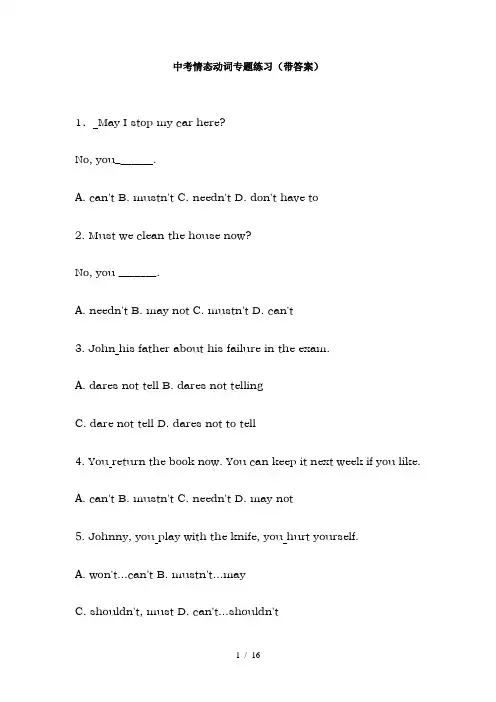
中考情态动词专题练习(带答案)1.May I stop my car here?No, you____.A. can'tB. mustn'tC. needn'tD. don't have to2. Must we clean the house now?No, you _______.A. needn'tB. may notC. mustn'tD. can't3. John his father about his failure in the exam.A. dares not tellB. dares not tellingC. dare not tellD. dares not to tell4. You return the book now. You can keep it next week if you like.A. can'tB. mustn'tC. needn'tD. may not5. Johnny, you play with the knife, you hurt yourself.A. won't...can'tB. mustn't...mayC. shouldn't, mustD. can't...shouldn't6. The fire spread through the hotel very quickly but everyone get out.A. had toB. wouldC. couldD. was able to7. Would you go out for a walk with me?No, I . My girl friend is coming.A. wouldn'tB. shall notC. won'tD. shouldn't8. Man die without water.A. willB. canC. needD. shall9. If he started at 9 0'clock, he be there by now.A. needB. shallC. ought toD. must10. I mailed the letter two weeks ago. She_____it.A. must receiveB. can't receiveC. might receiveD. must have received11.The professor gave orders that the experiment before 5:30p.m.A. be finishedB. will finishC. must be finishedD. would be finished12. There was plenty of time. You_____.A. mustn't hurryB. mustn't have hurriedC. needn't hurryD. needn't have hurried13. Tom was a diligent boy. He go to school though it was raining hard.A.was able toB. couldC. couldn'tD. wasn't able to14. ______I go back before lunch?No, I don't think you________.A. Need...mustB. Do...need toC. Must...have toD. May .... ought to15. The teacher do all the exercises, but a pupil_______.A. needn't....mustB. may not...mustC. needn't....needn'tD. can't....must16. Would you open the window please ?Yes, I______.A. willB. wouldC. doD. can17. A lion only attacks a human being when it is hungry.A. shouldB. canC. willD. shall18. ____Must I finish this novel this morning ?____No, you_____.A. mustn'tB. might notC. don't have toD. can't19. The taxi ____ only hold six passengers. It is full. You take the next one.A. may...mayB. can...mayC. may...canD. must...can20. I a little earlier, but I met a friend of mine on the way.A. may comeB. may have comeC. could have comeD. must have come21. I wish to go home now, I?A. mayB. can'tC. mustD. do22. He must have finished his homework, he?A. mustn'tB. didn'tC. needn'tD. hasn't23. This pen looks like mine, yet it isn't. Whose it be?A. mustB. canC. mayD. might24. He didn't do well in the exam. He hard at his lessons.A. must have workedB. ought to have workedC. would have workedD. has worked25. I wonder how he that to the teacher.A. dare to sayB. dare sayingC. not dare sayD. dared say26. Mr Baker, a number of students want to see you. _____ they wait here or outside?A. ShouldB. WillC. ShallD. Are27. You the trees. Look, it is raining now.A. mustn't have wateredB. needn't have wateredC. could have wateredD. might have watered28. I give you an answer tomorrow. I promise!A. mustB. willC. mayD. shall29. As a soldier, you do as the head tells you.A. willB. shallC. mayD. ought30. The streets are all dry. It_____ during the night.A. can't have rainedB. must have rainedC. couldn't rainD. shouldn't have rained31. "When _____ he leave the hospital?" I asked the doctor.A. willB. shallC. canD. may32. They have not finish the work up to now.____Well, they ______A. should haveB. shouldC. ought toD. ought have33. Since it is already midnight, we______.A. had better leavingB. ought to have leaveC. should take our leaveD. might as well leave34. you be happy!A. MayB. CanC. MustD. Would35. Must we come tomorrow?A. No, you can'tB. No, you needn'tC. No, you mustn'tD. No, you may not36. You miss the lesson, though we have it on Thursday.A. mustn't...needn'tB. needn't....mustn'tC. mustn't...mustn'tD. needn't...needn't37. To succeed in a difficult task,_____.A. one needs to work hardB. to work hard is neededC. you need be a hard working personD. to work hard is what one needs38. In case I______, I would try again.A. will failB. would missC. should failD. shall miss39. Some people feel that handguns______.A. should controlB. should be controlledC. must be controllingD. can be control40. ______ open the door for you ?A. Would you like that IB. Do you want that IC. Will ID. Shall I41. My son ____ the examination, but he wasn't careful enough.A. might be able to passB. must have passedC. could have passedD. were able to pass42. Isn't it strange that the lazy boy pass the exam?A. shouldB. hasC. mightD. would43. We the work so early without your help.A. couldn't finishB. can't finishC. couldn't have finishedD. can't have finished44. We the manager, but no one _____ his telephone number.A. could have called, knewB. could have called, had knownC. could call, had knownD. could call, knew45. "Would you come and join them?""I wish I . But I am busy at this moment.A. can'tB. couldn'tC. couldD. can46. If Alice this afternoon, the meeting should be put off.A. would not comeB. might not comeC. should not comeD. could not come47. I didn't see her in the meeting room this morning. She at the meeting.A. mustn't have spokenB. shouldn't have spokenC. needn't have spokenD. couldn't have spoken48. With so much work on hand, you to see the game last night.A. mustn't goB. shouldn't goC. couldn't have goneD. shouldn't have gone49. I thought you like something to read, so I have brought you some books.A. mayB. mightC. couldD. must50. There was plenty of time. She______.A. mustn't have hurriedB. couldn't have hurriedC. must not hurryD. needn't have hurried51. It's still early, you______.A. mustn't hurryB. wouldn't hurryC. may not hurryD. don't have to hurry52. Please open the window,________?A. can't youB. aren't youC. do youD. will you53. We for her because she never came.A. mustn't have waitedB. shouldn't have waitedC. mustn't waitD. needn't wait54. May I stop here?No, you ____.A. mustn'tB. might notC. needn'tD. won't55. He _____ you more help, even though he was very busy.A. might have givenB. might giveC. may have givenD. may give56. I didn't see her in the meeting room this morning.She at the meeting.A. mustn't have spokenB. shouldn't have spokenC: needn't have spoken D. couldn't have spoken57. Could I borrow your dictionary?Yes, of course you______.A. mightB. willC. canD. should58. Please don't make a noise.. I'll be as quiet as a mouse.A. Yes, I won'tB. No, I won'tC. No, I willD. Yes, I will59. The young man has made so much noise that he not have been allowed to attend theconcert.A. couldB. mustC. wouldD. should60. One ought for what one has done.A. not to be punishedB. to not be punishedC. to not punishedD. not be punished61. If you really want yourself to be in good health, you must always so much..A. not, be smokingB. not, have smokedC. not, to smokeD. be not, smoking62. Where is Mary?She isn't here. I think she_____.A. may have gone homeB. must have gone homeC. might have gone homeD. All the above63. I think Helen is at home.No, she be at home, for she phoned me from the airport just five minutes ago.A. mustn'tB. needn'tC. can'tD. dared not64. She is already two hours late. What to her?A. can have happenedB. may have happenedC. should have happenedD. must happen65. “he be watching TV now?”"Yes, he be watching TV now?""No, he be watching TV now."A. Must, can, mustn'tB. Can ,must, can'tC. Can, can, mustn'tD. May, must, needn't66. You must be a writer, ______?A. mustn't youB. are youC. must youD. aren't you67. You must have seen him last night, ?A. haven't youB. didn't youC. don't youD. must you68. I got up early this morning, but I _______so because I had no work to do.A. mustn't have doneB. didn't need to doC. needn't have doneD. can't have done69. Let's say that you could go there again, how feel?A. will youB. should youC. would youD. do you70. I daren't tell you what he did for fear that he angry with.A. will beB. isC. wasD. should be71. Without the leadership of the Party, there no New China.A. would beB. has beenC. wasD. should be72. It is necessary that we a foreign language.A. must masterB. ought to masterC. masterD. should master73. Most of the students felt rather disappointed at theEnglish party. They say that it ___ better organized.A. had beenB. had to beC. must have beenD. could have been74. I am surprised that he to help me when I needed it most.A. should refuseB. would have refusedC. should have refused toD. may have refused75. Look! Tom is too sleepy to work .He __ up watching TV.A. mustn't have stayedB. shouldn't have stayedC. mustn't stayD. ought not to say.练习题答案1-10 BACCB DCADD11-20 ADACA ACCBC21-30 ADBBD CBBBA31-40 BADAB AACBD41-50 CACAC CDDBD51-60 DDBAA DCBDA61-70 ADCAB DBCCB71-75 ADDCB。
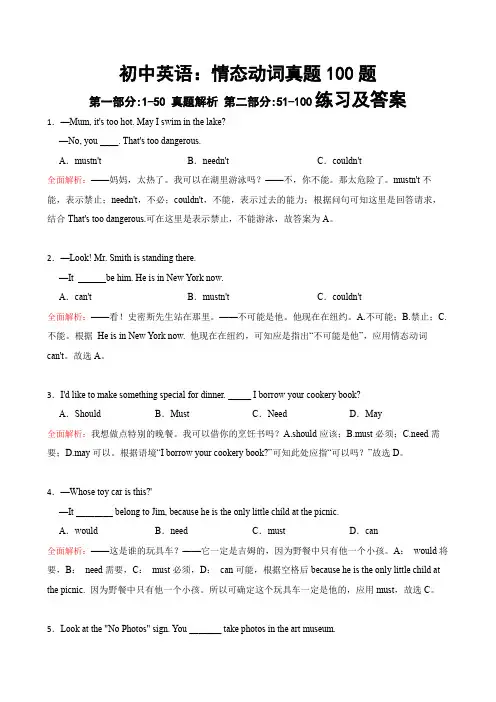
初中英语:情态动词真题100题第一部分:1-50 真题解析第二部分:51-100练习及答案1.—Mum, it's too hot. May I swim in the lake?—No, you ____. That's too dangerous.A.mustn't B.needn't C.couldn't全面解析:——妈妈,太热了。
我可以在湖里游泳吗?——不,你不能。
那太危险了。
mustn't不能,表示禁止;needn't,不必;couldn't,不能,表示过去的能力;根据问句可知这里是回答请求,结合That's too dangerous.可在这里是表示禁止,不能游泳,故答案为A。
2.—Look! Mr. Smith is standing there.—It be him. He is in New York now.A.can't B.mustn't C.couldn't全面解析:——看!史密斯先生站在那里。
——不可能是他。
他现在在纽约。
A.不可能;B.禁止;C.不能。
根据He is in New York now. 他现在在纽约,可知应是指出“不可能是他”,应用情态动词can't。
故选A。
3.I'd like to make something special for dinner. _____ I borrow your cookery book?A.Should B.Must C.Need D.May全面解析:我想做点特别的晚餐。
我可以借你的烹饪书吗?A.should应该;B.must必须;C.need需要;D.may可以。
根据语境“I borrow your cookery book?”可知此处应指“可以吗?”故选D。
4.—Whose toy car is this?'—It ________ belong to Jim, because he is the only little child at the picnic.A.would B.need C.must D.can全面解析:——这是谁的玩具车?——它一定是吉姆的,因为野餐中只有他一个小孩。
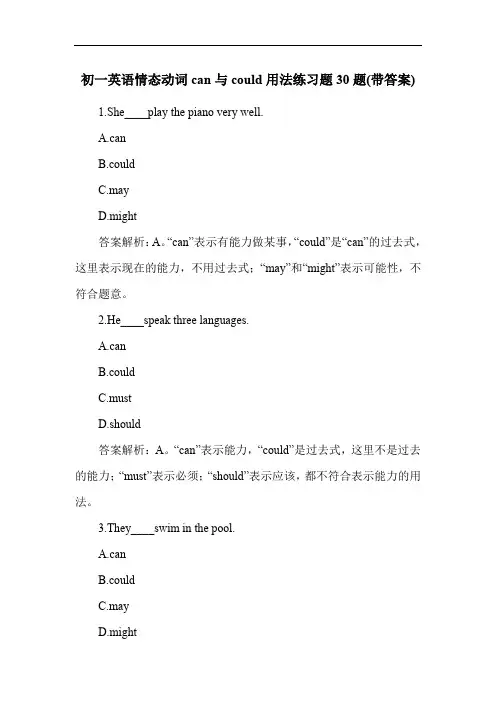
初一英语情态动词can与could用法练习题30题(带答案)1.She____play the piano very well.A.canB.couldC.mayD.might答案解析:A。
“can”表示有能力做某事,“could”是“can”的过去式,这里表示现在的能力,不用过去式;“may”和“might”表示可能性,不符合题意。
2.He____speak three languages.A.canB.couldC.mustD.should答案解析:A。
“can”表示能力,“could”是过去式,这里不是过去的能力;“must”表示必须;“should”表示应该,都不符合表示能力的用法。
3.They____swim in the pool.A.canB.couldC.mayD.might不是过去的能力;“may”和“might”表示可能性,不符合题意。
4.We____draw beautiful pictures.A.canB.couldC.mustD.should答案解析:A。
“can”表示有能力做某事,“could”是过去式,这里不是过去的能力;“must”表示必须;“should”表示应该,都不符合表示能力的用法。
5.I____ride a bike.A.canB.couldC.mayD.might答案解析:A。
“can”表示有能力做某事,“could”是过去式,这里不是过去的能力;“may”和“might”表示可能性,不符合题意。
6.She____sing many songs.A.canB.couldC.mustD.should不是过去的能力;“must”表示必须;“should”表示应该,都不符合表示能力的用法。
7.He____play basketball well.A.canB.couldC.mustD.should答案解析:A。
“can”表示有能力做某事,“could”是过去式,这里不是过去的能力;“must”表示必须;“should”表示应该,都不符合表示能力的用法。
【英语】情态动词练习题(含答案)一、初中英语情态动词1.—We've got everything ready for the picnic.—Do you mean I __________ bring anything with me?A. can'tB. mustn'tC. couldn'tD. needn't【答案】 D【解析】【分析】句意:—我们已经为野餐准备好了一切。
—你的意思是我不必带任何东西吗?A. can't 不能;B. mustn't 表示禁止,一定不要;C. couldn't不能,表示过去时态;D. needn't不必。
结合句意,故选D。
【点评】本题考查情态动词的用法。
2.—How amazing this robot is!—Wow, it has video cameras in its eyes, so it “see” and interact with people.A. mayB. canC. mustD. should【答案】 B【解析】【分析】句意:—这个机器人多么惊人啊!—哇,在它的眼睛里有摄像机,因此它能看见和人打交道。
A. may 可以,可能;表示许可,B. can 能;表示能力,C. must 必须;D. should应该;根据it has video cameras in its eyes,可知是有能力看见,故选B。
【点评】考查情态动词辨析。
熟记情态动词的含义和用法。
3.A hard-working man ______ become a great scientist, but a great scientist _______ be a hard-working man.A. can't; canB. may not; mustC. can't; mustD. may not; can【答案】 B【解析】【分析】句意:一个勤奋的人可能不会成为一位伟大的科学家,但是一位伟大的科学家一定是一个勤奋的人。
( )1 John come to see us tonight, but he isn't very sure yet.A. mayB. canC. has toD. Must2 They do well in the exam.A. can be able toB. be able toC. can able toD. are able to3—May I take this book out? —No, you .A. can'tB. may notC. needn'tD. aren't4You go and see a doctor at once because you're got a fever. A. can B. must C. dare D. would 5 —Can you speakJapanese? —No, I .A.mustn'tB. can'tC. needn'tD. may not1. –He be in the classroom, I think —No, he be in the classroom. I saw him go home a minute ago. A. can; may not B.must; may not C. may; can't D. may; mustn't2 —Shall I get one more cake for you, Dad? —Thanks, but you , I've had enough. A. may not B. must not C. can't D.needn't 3 Even the top students in our classcan't work out this problem, so it be very d ifficult.A. mayB. mustC. canD.need4He isn't at school. I think he be ill.A. canB. shallC. mustD.has to5I take this one?A. MayB. WillC. AreD. Do1 The children play football on the road.A. can'tB. canC. mustn'tD.must2You be late for school again next time.A. mustn'tB. needn'tC. don't have toD. don't need to3—Must I do my homework at once? —No,you . A. needn't B. mustn't C. can'tD. may not 1 His arm is all right. He goand see the doctor.A. has not toB. don't have toC. haven't toD. doesn't have to2He had to give up the plan, he?A. didB. didn'tC. doesD.doesn't 3 They had to walk here, they?A. mustn'tB. didC. didn'tD. hadn't1 He had better stay here, he?A. doesn'tB. don'tC. hadn'tD. isn't2 You'd better late next time.A. not to beB. not beC. won't beD. don'tbe3You'd better your hair once a month.A. had; cutB. had; cuttedC. have; cutD. have; cutted4You ask that man over there. Maybe heknows the way. A. had better n ot to B.had not better C. had better D. hadbetter not1—Shall we go and visit the History Museumnext Sunday? —A. Here you areB. Sorry, I can'tC. Yes, pleaseD. Let me try2—Why don't you ask Mike to go with us? —for her. A. can B. should C. might D.Thanks, .A. I willB. I won'tC. leanD. I may 3 —I take the newspaper away? —No, you mustn't. You read it only here.A. Must; canB. May; canC. Need; mustD. Must; must1Excuse me. you please pass me that cup? A. had to write it out B. must have written itout C. should have written it out D. oughtto write it out 2. —There were already fivepeople in the car but they managed to take me aswell. —It a comfortable journey.A. can’t beB. shouldn’t beC. mustn’t have beenD. couldn’thave been 3. It’s nearly seven o’clock.Jackneed7.—I stayed at a hotel while in New York. —Oh,did y ou? You with Barbara.A. could have stayedB. could stayC. would stayD. must have stayed8.—Are you coming to Jeff’s party? —I’m notsure. I go to the concert instead.A. DoB. ShouldC. WouldD. Must be here at any moment. A. must B. would C. should D.2 you like to have another try?A. CouldB. WillC. WouldD. Do3—Would you like to go boating with us? —Yes, . A. I'd like B. I want C. I'd like to D. I do 1 You worry about your son. He will get well soon. A. needn't B. can'tC. mustn'tD. have to 2 The poor man needs our help, he?A. needB. needn'tC. doesD. doesn't3 —Must we do our homework first? —No, you . You may have a rest first. A. must B. Need C. should D. can4.Johnny, you play with the knife, youhurt yourself.A.won’t;can’tB. mustn’t; mayC.shouldn’t; mustD. can’t;shouldn’t5.The fire spread through the hotel very quicklybut everyone get out.A.had toB. wouldC. couldD. was able tomight9.I was really anxious about you. Youhome without a word.A. mustn’t leaveB. shouldn’thave left C. couldn’t have left D.needn’t leave10.—Is John coming by train? —He should,but he not. He likes driving his car.A. mustB. canC. needD.may11.A left-luggage office is a place where bags 6. —When can I come for the photos? I needbe left for a short time, especially at aA. mustn'tB. needn'tC. may notD. can't1. I told Sally how to get here, but perhaps I them tomorrow afternoon. —They beready by 12:00.railway station.12.I wonder how he that to the teacher.A. dare to sayB. dare sayingC. not dare sayD. dared say13.When he was there, he go to that coffee shop at the corner after work every day.A. wouldB. shouldC. had betterD. might14.It has been announced that candidates remain in their seats until all the papers have been collected. A. can B. will C. may D. shall15.How ou say that you really understand the whole story if you have covered only a part of the article? A. can B. must C. need D. may 16. —I hear you’ve got a set of valuable Australian coin. I have a look? —Yes, certainly.A. DoB. MayC. ShallD. Should【巧学活用参考答案】 1. 1-5 A D A B B 2. 1-3 A D B情态动词练习参考答案 1. C。
初中英语:情态动词真题100题第一部分:1-50 真题解析第二部分:51-100练习及答案1.—Mommy, may I go swimming now?—Yes, honey, but remember that you _____go with your Daddy.A.must B.may C.would D.can全面解析:——妈妈,我现在可以去游泳了吗?——是的,亲爱的,但记住你必须和你爸爸一起去。
must必须;may可以,可能;would将会;can能;根据yes和转折词but,可知是可以去但必须跟爸爸一起,must符合题意,故答案为A。
2.— Whose notebook is this?— It _______________ Bill's. It has his name on it.A.can't be B.must be C.can be D.mustn't be全面解析:——这是谁的笔记本?——一定是比尔的。
can't be不可能是,表示否定的推测;must be 一定是;can be可以是,可能;上面有他的名字。
mustn't be 不能;根据It has his name on it. 上面有他的名字,可知,这个笔记本一定是吉姆的,表示肯定的推测,故答案为B。
3.—____________ you call back tomorrow?— Of course I can.A.Can B.Must C.May D.Need全面解析:——你能明天再打来吗?——我当然可以。
can,可以;must,必须;may,可以,主语常用第一人称;need,必须。
都是情态动词。
从答语中can知,问句也用can。
故选A。
4.— Two hundred yuan for such a T-shirt! You ___________________ be joking!— I'm not joking. It's made of silk.A.can't B.can C.need D.must全面解析:——这样一件T恤要两百块!你一定是在开玩笑!——我不是在开玩笑。
情态动词专项练习题及答案一、初中英语情态动词1.— I take the magazine out of the reading room?— I'm sorry you .A. Could; couldn'tB. Must; couldn'tC. Will; can'tD. May; can't【答案】 D【解析】【分析】句意:——我可以把杂志带出阅览室吗?——对不起,你不能。
could 能,可以;must必须;will将;may可以;can能,可以,can't不可以,不能。
此处表示请求许可,用could或者may,由could或者may构成的一般疑问句,肯定回答用yes,主语+can,否定回答用sorry,主语+can't,结合选项,故答案选D。
【点评】考查情态动词的辨析。
注意理解句意,理解选项,根据语境,选出正确的答案。
2.— Shall I book some seats for the concert?—______. I've done that.A. Yes, you mayB. No, you mustn'tC. No, you needn'tD. No, you can't【答案】C【解析】【分析】Yes, you may是的,你可以;No, you mustn't 不,你千万不要;No, you needn't不,你不必;No, you can't不,你不能。
句意:我要预定一些音乐会的座位吗?根据下文,我已经办了。
可知选C最符合语境。
【点评】考查交际用语3.— _________ I take my cousin Shirley with us, Mr. Wu?— Yes, but we'll get there by bike. ____________ she ride a bike?— Yes, and she ___________ ride a bike when she was only six years old.A. Could; can; couldB. Can; can; canC. Can; could; couldD. Could; could; can【答案】 A【解析】【分析】句意:-我能带我表弟雪莉和我们一起吗,吴先生?-是的,但我们将骑自行车去那儿。
初中英语情态动词详细用法归纳(含练习及答案)情态动词有具体的词义, 但也同助动词一样, 需要与其他词语一起构成句子的谓语, 另外情态动词没有人称和数的变化, 情态动词后必须跟动词原形。
1.ca.的用法:(1).表示能力、许可、可能性.表示能力时一般译为“能、会”.即有种能力, 尤其是生来具备的能力.如:Sh.ca.swi.fast.bu..can’.. 她能游得很快, 但我不能。
.ca.se.wit.m.eyes.我用眼睛看。
could是can的过去式。
表示过去的能力.b.abl.t.d.sth.常常指经过努力,花费了时间和劳力之后才能做到某事。
is/am/ar.abl.t.d.sthwas/were able to do sth.(2).表示许可, 常在口语中。
如: .m.dictionary..你可以用我的字典。
(3).表示推测, 可能性, 意为“可能”.常用于否定句和疑问句中.此时can’.译为.不可能”.如:Ca.th.new.b.true.这个消息会是真的吗?—Ca.i.b.ou.teacher?那个人有可能是我们老师吗?—No.i.can’.b.ou.teacher.H.i.o..visi.t.th.Grea.Wall.不可能。
咱们老师正在游览长城呢。
【例题】—.thin.Mis.Ga.mus.b.i.th.library.Sh.sai.sh.woul.g.there.—No.Sh.__b.there..hav.jus.bee.there..A.can’.B.mustn’.C.needn’.D.wouldn’t【解析】根据下文“我刚去过那儿”可知, 应为“不可能”, can’t 表示推测[答案] Acould的用法:(1).can的过去式, 意为.能.会”, 表示过去的能力。
如: H.coul.writ.poem.whe.h.wa.10. 他十岁时就会写诗。
(2).could在疑问句中, 表示委婉的语气, 此.coul.没有过去式的意思。
情态动词专项练习(附答案)一、初中英语情态动词1.—Look! The woman at the school gate ______be her headmaster.—No, it ______ be her. She is holding a meeting in the office now.A. must; can'tB. must; mustn'tC. can; needn'tD. may; mustn't【答案】 A【解析】【分析】句意:——看!学校门口的那个妇女一定是她的校长。
——不,不可能是她。
第一空,must表示“一定”;空二,根据She is holding a meeting in the office now. 她现在正在办公室开会,可知,不可能是校长,用can't,表示不可能。
故选A。
【点评】考查情态动词辨析。
注意不同情态动词的用法,注意理解句意。
2.Teenagers allowed to drive .A. should not beB. should be notC. not should be【答案】A【解析】【分析】句意:年轻人不应该被允许驾车。
Should是情态动词,其否定表达一般在在后面加副词not,故选A。
【点评】此题考查含有情态动词的被动语态的否定形式。
平时注意记忆情态动词的记忆和用法。
3.You be tired after walking for such a long time. Sit down and have a rest.A. canB. can'tC. mustn'tD. must【答案】 D【解析】【分析】句意:走了这么长时间你一定很累了。
坐下休息一下吧。
can能,能够,can't不能,对事物进行否定推测;mustn't一定不是,禁止,must一定,对事物进行肯定推测,根据after walking for such a long time,可以肯定你一定很累,所以是进行肯定推测,情态动词使用must,故选D。
( )1 John___ come to see us tonight, but he isn't very sure yet.A. mayB. canC. has toD. Must2 They ___ do well in the exam.A. can be able toB. be able toC. can able toD. are able to3 —May I take this book out? —No, you___.A. can'tB. may notC. needn'tD. aren't4 You___ go and see a doctor at once because you're got a fever. A. can B. must C. dare D. would5 —Can you speak Japanese? —No, I____.A. mustn'tB. can'tC. needn'tD. may not1. – He___ be in the classroom, I think —No, he ___ be in the classroom. I saw him go home a minute ago. A. can; may not B. must; may not C. may; can't D. may; mustn't2 —Shall I get one more cake for you, Dad? —Thanks, but you___, I've had enough.A. may notB. must notC. can'tD. needn't 3 Even the top students in our class can't work out this problem, so it be very difficult.A. mayB. mustC. canD. need4 He isn't at school. I think he ___ be ill.A. canB. shallC. mustD. has to5 ___ I take this one?A. MayB. WillC. AreD. Do1 The children___ play football on the road. A. can't B. can C. mustn't D.must2 You ___ be late for school again next time.A. mustn'tB. needn'tC. don't have toD. don't need to3 —Must I do my homework at once? —No,you___. A. needn't B. mustn't C. can'tD. may not 1 His arm is all right. He___ goand see the doctor.A. has not toB. don't have toC. haven't toD. doesn't have to2 He had to give up the plan, ___ he?A. didB. didn'tC. doesD.doesn't 3 They had to walk here, ___ they?A. mustn'tB. didC. didn'tD. hadn't1 He had better stay here, ___ he?A. doesn'tB. don'tC. hadn'tD. isn't2 You'd better___late next time.A. not to beB. not beC. won't beD. don'tbe3 You'd better ___ your hair ___ once a month.A. had; cutB. had; cuttedC. have; cutD. have; cutted4 You___ ask that man over there. Maybe heknows the way. A. had better not to B.had not better C. had better D. hadbetter not1 —Shall we go and visit the History Museumnext Sunday? —________A. Here you areB. Sorry, I can'tC. Yes, pleaseD. Let me try2 —Why don't you ask Mike to go with us?—Thanks, ___.A. I willB. I won'tC. leanD. Imay 3 —___ I take the newspaper away?—No, you mustn't. You____read it only here.A. Must; canB. May; canC. Need; mustD. Must; must1 Excuse me. ___ you please pass me that cup?A.DoB. ShouldC. WouldD. Must2 ___ you like to have another try?A. CouldB. WillC. WouldD. Do3 —Would you like to go boating with us? —Yes,___. A. I'd like B. I want C. I'd like toD. I do 1 You___ worry about your son. He willget well soon. A. needn't B. can't C.mustn't D. have to 2 The poor manneeds our help, ___ he?A. needB. needn'tC. doesD. doesn't3 —Must we do our homework first? —No,you___. You may have a rest first.A. mustn'tB. needn'tC. may notD. can't1. I told Sally how to get here, but perhaps I_______ for her.A. had to write it outB. must have written itout C. should have written it out D. oughtto write it out 2. —There were already fivepeople in the car but they managed to take me aswell. —It _______ a comfortable journey.A. can’t beB. shouldn’t beC. mustn’t have beenD. couldn’t havebeen 3. It’s nearly seven o’clock. Jack _______ behere at any moment.A. mustB. NeedC. shouldD. can4. Johnny, you _______ play with the knife, you_______ hurt yourself.A. won’t; can’tB. mustn’t; mayC.shouldn’t; mustD. can’t; shouldn’t5. The fire spread through the hotel very quickly but everyone _______ get out.A. had toB. wouldC. couldD. was able to6. —When can I come for the photos? I need them tomorrow afternoon. —They _______ be ready by 12:00.A. canB. shouldC. mightD. need7. —I stayed at a hotel while in New York. —Oh, did y ou? You _______ with Barbara.A. could have stayedB. could stayC. would stayD. must have stayed8. —Are you coming to Jeff’s party? —I’m not sure. I _______ go to the concert instead.A. mustB. wouldC. shouldD. might9. I was really anxious about you. You _______ home without a word.A. mustn’t leaveB. shouldn’t have leftC. couldn’t have leftD. needn’t leave10. —Is John coming by train? —He should, but he _______ not. He likes driving his car.A. mustB. canC. needD. may11. A left-luggage office is a place where bags _____ be left for a short time, especially at a railway station.A. shouldB. canC. mustD. will12. I wonder how he _______ that to the teacher. A. dare to say B. dare sayingC. not dare sayD. dared say13. When he was there, he ___ go to that coffeeshop at the corner after work every day.A. wouldB. shouldC. had betterD.might14. It has been announced that candidates _____remain in their seats until all the papers havebeen collected. A. can B. willC. mayD. shall15. How ______ou say that you really understandthe whole story if you have covered only a part ofthe article? A. can B. mustC. needD. may 16. —I hear you’ve got aset of valuable Australian coin. _______ I have alook? —Yes, certainly.A. DoB. MayC. ShallD.Should【巧学活用参考答案】 1. 1-5 A D A B B 2.1-5 C D B C A 3. 1-3 C A A 4. 1-3 D B C 5.1-4 C B C C 6. 1-3 B A B 7. 1-3 C C C 8.1-3 A D B情态动词练习参考答案 1. C。